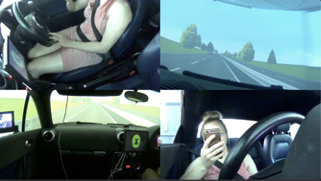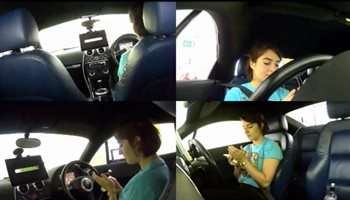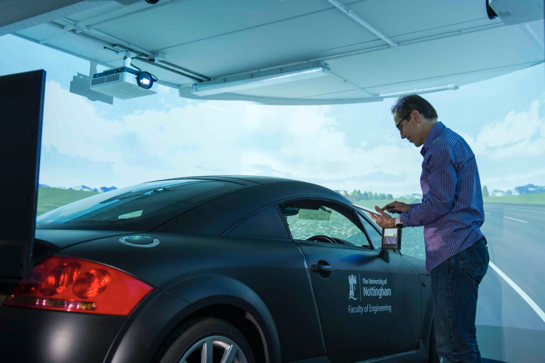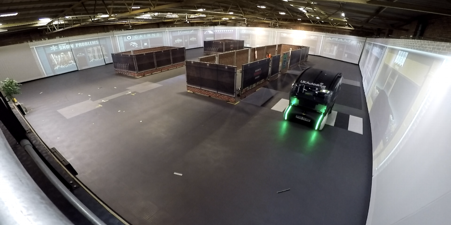Road Transport
Within this theme, we conduct research into the core human factors issues concerning the road transport sector, relating to fundamental goals of safety, efficiency, comfort, positive user experience, and so on.
- What are the impacts (distraction, workload, trust, acceptance, etc.) of in-car technology on the driver?
- What is the potential for novel HMIs in a driving context, for example, natural speech, augmented reality head-up displays, gesture-driven interfaces, etc.?
- What methods and measures are appropriate for use in the design and evaluation of vehicle-based HMIs?
We have particular expertise in the use of driving simulators as a means of investigating these issues in a safe, controlled and cost-effective environment. In this respect, we have a range of medium and high fidelity simulators and associated equipment (eye tracking, physiological sensors, emotion tracking) for use in our research. Moreover, we commonly use instrumented vehicles as a means of conducting research in more realistic (ecologically valid) environments.
Projects
User Behaviour in Level 3 Automated Vehicles
Summary:
In this project sponsored by the RAC Foundation we have investigated how drivers are likely to interact with future SAE level 3 vehicles in which they have extended periods of not driving, but need to intervene to take control of the vehicle in different scenarios. This project has used a highly novel approach in with 49 participants experienced a commute everyday for a week in our driving simulator with a proposed L3 vehicle - essentially a longitudinal simulator study. On thursday they encountered an emergency takeover request due to poor weather conditions where we could examine how well they could resume control. We could also explore how user trust varied throughout the week according to their experiences. This research has provided considerable data on how users of future vehicles are likely to interact with automation - which can inform designers, engineers and policy makers.
HFRG members:

HMI Design for Highly Automated Driving
Summary:
This project is funded by a major vehicle manufacturer and is considering how to design the HMI for future highly automated driving to allow the ‘driver’ to seamlessly resume control of his/her vehicle in a range of different scenarios. A number of driving simulator studies will be conducted with over 60 participants investigating varying HMI configurations. As part of the work, we are also aiming to understand what measures are particularly relevant to the resumption of driving, such as the physical interaction with primary controls, posture changes, speed profiles, eye movements, physiological markers, and so on.
HFRG members:
Prospect

Driver Training for Future Automated Vehicles
Summary:
This project sponsored by the RAC Foundation is investigating what requirements there will be for new forms of training of users of vehicles with varying degrees of automation. It it widely recognised now that automation will fundamentally change the nature of 'driving' requiring new skills/knowledge, but also potentially leading to a loss of certain skills. We have carried out a series of interviews with expert drivers, driving instructors and trainers for driving instructors - to explore what they believe the implications of automation will be for training. We will also conduct a simulator study to investigate how different forms of training could assist users of future vehicles - especially in specific tasks associated with automation, such as the resumption of control of a moving vehicle.
Driver Training for Future Automated Vehicles Introducing CHAT (Check, Assess and Takeover)
HFRG members:

Natural Language Interfaces for Automated Pods
Summary:
For highly and fully automated vehicles of the future there is a real concern about lack of trust or particularly a non-calibrated trust - that is, trust not aligned with the actual capabilities of the technology. Conversely, there is a recognition that trust develops in human-human conversations which can be mirrored in interactions that humans might have with natural language interfaces (NLIs). In this project, conducted in collaboration with a major automotive company, we are considering how users of low-speed pod type vehicles might develop trust in an automated pod in which they are free to converse with the vehicles through a NLI. The pods are real autonomous vehicles operating in a large indoor space, whereas we simulate the NLI using the Wizard of Oz approach with a professional actor who 'plays' the computer in an extremely convincing way. Results so far have demonstrated how the inclusion of a NLI in these vehicles helps to nurture appropriate trust and has highlighted some trust markers through a socio-linguistic analysis of the conversations occurring between the human and the machine.
HFRG members:

